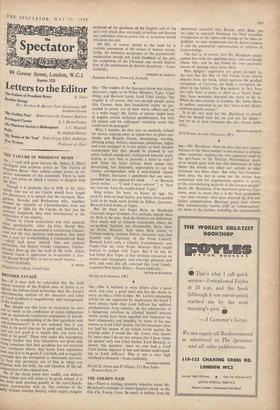BROTHER SAVAGE
Sin,—If it may well be concluded that the chief Moral function of the English man of letters is to deliver his fellows from barbarism, then Mr. Levin's discriminating analysis of the character and mind of Lord Goddard is magnificently and courageously in the tradition. But, should not this form of barbarism be seen not so much as the confluence of moral indignation and an exclusively retributive conception of punish- ment, as the compounding of the first ingredient with self-righteousness? Is it not assumed that if you want to be good you can be good and, therefore, if You are not good it is simply that you have not tried to be good? Those who make this assumption assume further that they themselves are good and, being conscious that their goodness has not involved Yell' strenuous efforts, they know from experience 'IOW easy it is to be good, if you wish;and so logically conclude that the wrongdoer is obstinately perverse. To beat that perversity out of him is, when you dispense with the frills, the sold function of the ad- ministration of the criminal law.
We of the clergy know how readily and without ironic intent men will claim to be good; indeed, it is the most used opening gambit in the non-Church- man's conversation with us. The archives of the Sadly defunct Gordon Society could supply pungent evidence of the goodness of the English and of the zeal with which they are ready to wallop and destroy any individual who (a priori, out of malicious intent) lets down the side.
All this, of course, points to the need for a realistic assessment of the causes of human wrong- doing. An exclusive 'acceptance of the, psychiatrists' explanation would rob Lord Goddard of his job; the acceptance of the Christian one would deprive him of the satisfaction he derives therefrom.—Yours faithfully,
HERBERT R. BARTON
Banham Rectory, Norwich, Norfolk


































 Previous page
Previous page